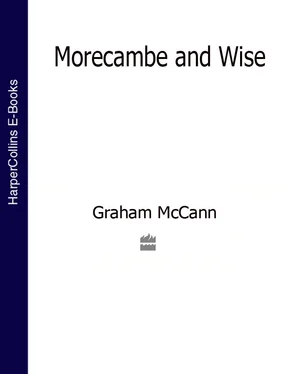It is certainly hard not to be struck by the fact that so many of the most memorable and original performers associated with a comic tradition running from the earliest days of music-hall through Variety and the BBC’s old North of England Home Service to the era of television have come from this solitary county: Billy Bennett, Harry Weldon, Robb Wilton, Fred Yule, Arthur Askey, Tommy Handley and Ken Dodd (all from Liverpool); George Formby Senior (from Ashton-under-Lyne); George Formby Junior, Frank Randle and Ted Ray (all from Wigan); Hylda Baker (Farnworth); Ted Lune (Bolton); Tubby Turner (Preston); Wilkie Bard and Les Dawson (Manchester); Al Read (Salford); and Gracie Fields, Tommy Fields and ‘Lancashire’s Ambassador of Mirth’, Norman Evans (Rochdale). What all of these otherwise disparate performers had in common was an accent that proved itself, as Priestley put it, ‘admirable for comic effect, being able to suggest either shrewdness or simplicity, or, what is more likely than not, a humorous mixture of both’, 3lending itself both to ironical under-statement (such as the exceptionally serviceable ‘Fancy!’ – used to register surprise at anything from run-of-the-mill gossip to declarations of war) and ingeniously sly put-downs (such as, ‘’Ave you ’ad your tea? We’ve ’ad ours!’ or, ‘I’d offer you a slice of pie, love, but there’s none cut into’). 4Priestley, attempting to define the distinctive character of the sound, listed ‘shrewdness, homely simplicity, irony, fierce independence, an impish delight in mocking whatever is thought to be affected and pretentious. That is Lancashire’. 5It was also, of course, unmistakably Eric Morecambe.
Ernie Wise, on the other hand, was a Yorkshireman. He was more than happy on stage and screen to play up to all of the old stereotypical character traits associated with the flat-capped tyke: arrogance (‘Welcome to the show,’ he would say to the audience. ‘What a pleasure it must be for you to be seeing me once again!’), conceit (the much-mocked wig), bluntness (when roused he would not hesitate to itemise all of his partner’s inadequacies) and stinginess (he would always be ashen-faced whenever a guest was brave enough to inquire about the possibility of a fee). There was also, of course, the Yorkshire accent – ‘quieter, less sociable and less given to pleasure’, according to the Bradford-born Priestley, ‘more self-sufficient and more conceited, I think, than the people at the other and softer side of the Pennines’ 6– capable itself of conveying varying degrees of warmth, vulnerability and wit (witness the delivery of such gifted and popular comics as Albert Modley, Dave Morris, Harry Worth or Sandy Powell 7), but ideally suited to the special technical skills of the straight-man.
Placed side by side, like their respective counties, Morecambe and Wise were able to play out their own private War of the Roses. Eric was hot, Ernie was cold. Eric was supple, Ernie was stiff. Eric was droll, Ernie was dour. Eric was playful with language, Ernie was respectful of it. Eric had the quick wit, Ernie the slow burn (ERNIE: ‘How do you spell incompetent?’ ERIC: ‘E-R-N-I-E.’ ERNIE: ‘E-R- … Doh!’). Eric knew all about the double entendre, Ernie still had much to learn about the single entendre (ERNIE: ‘I’ve always said there are no people like show people.’ ERIC: ‘Ask any prison warden.’). Eric liked to dress down (string vest, oversized khaki shorts, black suspenders, black socks and black shoes), Ernie loved to dress up (ill-advised ‘fashionable’ garments, odd ‘writerly’ outfits or white tie and tails). Eric was happy to appear less intelligent and cultured than he really was (‘I saw a play on TV last night: there was this woman – you could see her bum!’), Ernie yearned to appear less stupid and gauche than he really was (‘I’ve got 23 A levels, you know – 17 in Mathematics, and another 2, making 23’). While Eric had his feet planted firmly on the ground, Ernie’s head would sometimes float high up into the clouds (ERNIE: ‘You’re ruining everything! You’re making us look like a cheap music-hall act!’ ERIC: ‘But we are a cheap music-hall act!’).
Morecambe and Wise never were, strictly speaking, a music-hall act (the music-hall, as a distinct form of entertainment, had given way to the more structured commercial appeal of Variety long before either of them was born 8), nor were they, except in the very early days, ‘cheap’, but the allusion, in spite of this, made sense. Both Morecambe and Wise grew up in poor communities rich in music-hall traditions: ‘We’re working-class comics,’ said Wise. ‘We didn’t go to college.’ 9They went, instead, to the halls, where they studied every facet of Northern humour. ‘There used to be a big difference between North and South in humour,’ observed Wise, ‘and there used to be a definite dividing line between “Oop fert cup” and all that.’ 10
Many of the old theatres were still standing and most of them were still in use – such as the huge Winter Gardens in Morecambe and the small but very popular City Varieties in Leeds – although some had been transformed into cinemas by the twenties and thirties. These halls, situated as they often were in the poorer areas of the industrial towns, could seem to young people with dreams of better futures like strange, exotic and magical places of escape and adventure. The look of them alone was extraordinary – such as the Moorish Palace Theatre in Hull, with its glass-roofed conservatory, sumptuous crush-room and Indian-style entrance festooned with palms and ferns; or the shoe-box-small Argyle in Birkenhead, a self-consciously nostalgic construction with long narrow galleries and a uniquely warm and intimate atmosphere; or the medium-sized Bradford Alhambra, designed in the English Renaissance style and accommodating an exceptionally wide stage for all kinds of odd and ambitious productions.
Once inside these unworldly places the curious encountered novel sights and sounds of even deeper resonance: acrobats, unicyclists, tight-rope walkers, jugglers, paper-tearers, illusionists, dancers and singers. There were novelty acts such as the man who dressed up in a red wig and the uniform of the Ruritanian Navy, balanced himself on the top rung of a swaying ladder and then sang a song about his mother, or the contortionist who would leap out from within a little box and throw himself into fearsome postures, or Herr Gross and his Educated Baboons and John Higgins, ‘The Human Kangaroo’. Centre-stage, up and down the bill, were the comics – some brash and flashy, some shy and reserved, some piebald and pinguid – full of jokes about the mother-in-law, the lodger, the wife, the neighbours, the coal-mines and the cotton mills, showing off their red wigs and redder noses, check trousers and big boots, never stopping, never serious, never giving up. A splendid time was guaranteed for all.
‘It’s a fantastic thing,’ said Ernie Wise, reflecting on the success of his partnership with Eric Morecambe, ‘because all we have done is adapt music-hall on to the television and make it acceptable.’ 11It was, as an explanation, a simplification of a complex process, but it was, none the less, a revealing observation. Much of what came to be associated with Morecambe and Wise, in terms of gestures, phrases, attitudes and even routines, had its roots firmly in the music-hall experiences of their youth. The sand dance performed by Morecambe and Wise and Glenda Jackson in their celebrated ‘Cleopatra’ sketch was a homage to the great eccentric dancers Wilson, Keppel and Betty. The cod-vent act, performed by Eric Morecambe with dummies of varying shapes and sizes, owed much to Sandy Powell’s earlier version (POWELL: ‘How are you?’ DUMMY: ‘Aying gerry yell chrankchyew!’ POWELL: ‘He says he’s very well.’). Eric’s impromptu monologues (‘They were married at Hoo-Flung-Wotnot/But they had no children sweet/He was fifty and fat/She was fatter than that/So n’ere the twain will meet – boom boom!’) were borrowed from Billy Bennett. The regular bits of comic business involving the plush golden ‘tabs’ – tableaux curtains – such as Eric’s ‘mad throttler’ mime, had been inherited from innumerable half-forgotten old comics who once worked the halls. The direct address to the audience – ‘What do you think of the show so far?’ – harked back to a bygone era of a more intimate brand of popular entertainment.
Читать дальше











![Brian Thompson - A Monkey Among Crocodiles - The Life, Loves and Lawsuits of Mrs Georgina Weldon – a disastrous Victorian [Text only]](/books/704922/brian-thompson-a-monkey-among-crocodiles-the-life-thumb.webp)
